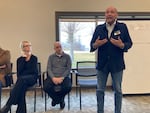
State Rep. Greg Smith, R-Heppner, right, speaks to an audience at a Boardman town hall about Measure 110 as Community Counseling Solutions director Kimberly Lindsay, left, and Boardman Police Chief Rick Stokoe listen.
Antonio Sierra / OPB
Eastern Oregon voters never fully embraced drug decriminalization, but a sharp turn in public opinion means they may never have to.
When state Rep. Greg Smith asked a Boardman audience on Saturday how many of them wanted to recriminalize drugs, most of the few dozen people in the conference room shot up their hands. While the Heppner Republican was asking how many of his constituents were in favor of classifying drug possession as the most serious class of misdemeanor, several audience members said they would like the state to go further and turn it into a felony.
Measure 110, a referendum that decriminalized drug possession and redirected state revenue for addiction treatment, passed a statewide vote handily in 2020. Despite its statewide success at the ballot, Eastern Oregon counties rejected the measure by comfortable margins.
Barely three years after the law took effect, public opinion has turned sharply against Measure 110 amid persistent homelessness and a fentanyl epidemic that’s hit the state hard. As lawmakers in Salem prepare to roll back key parts of the measure in the ongoing legislative session, Smith has a seat on the interim committee responsible for reworking the policy. He gathered people in Boardman over the weekend to get local input before returning to the Capital this week.
Smith found an audience eager to get the criminal justice system back involved in drug addiction, even as many admitted that the region did not have the infrastructure to properly treat it.
A return to criminalization
Smith gave the first speaking slot to Morrow County District Attorney Justin Nelson, who has been the county’s head prosecutor for more than a decade.
Nelson said drug possession was not a victimless crime because some users commit crimes like theft to fund their addiction. People caught with drugs needed the threat of jail time in addition to treatment options, he said.
“I want that incentive,” Nelson said. “I want that incentive to try to keep on the straight line. That’s the idea with the misdemeanor, the felony offenses, sometimes probation. That’s the hope for it.”
Many of the people who spoke at Smith’s town hall were elected officials, people with law enforcement backgrounds, or in some cases, both.
Dain Gardner, a Hermiston School Board member and retired Oregon State Police trooper, said another reason Measure 110 has failed was because police officers’ motivation levels depended on what level of crime was associated with drug possession. Some Democratic lawmakers have suggested drug possession should be classified as the lowest level of misdemeanor if the state overturns Measure 110.
“You’re not going to work as hard for a misdemeanor as you would for a felony,” Gardner said. “And then you drop it to (a Class) E violation, you get to create something lower than a seatbelt ticket so these people can come into compliance. (They’re) still not going to come into compliance because there’s nothing there.”
Some, like Hermiston City Councilor Doug Primmer, compared people with addiction issues to children in need of consequences.
“If there are no consequences, just like your kid, they don’t learn that they’re not supposed to do that,” he said. “It may take them putting their hand on the hot stove to figure out, ‘Hey, I don’t touch hot stoves.’”
A lack of options
Many in the audience shared stories of family members and friends who were in recovery or still in the throes of addiction. Some were in recovery themselves.
Kimberly Lindsay said it took six attempts for her father to stay sober and she was grateful for the role law enforcement played in her father’s recovery.
Lindsay is the director of Community Counseling Solutions, a Heppner nonprofit that’s received funding from Measure 110 and has been responsible for providing addiction services for much of Eastern Oregon since the law’s passage.
But even as she supported making changes to Measure 110, she said there still wasn’t enough addiction treatment options in the region.
Lindsay acknowledged a detox center in Pendleton, but said the area needs facilities for sober living and crisis resolution, the latter providing support for the related mental health and personal issues that lead to and sustain addiction. Smith said he was working on getting funding for addiction treatment facilities in The Dalles and Ontario, but added that still left massive geographic gaps across Eastern Oregon.
Studies have shown that increasing the punishment for crimes doesn’t usually act as a deterrent. And tightening drug laws can also have other unintended effects. After Colorado passed an anti-fentanyl bill in 2022, drug overdoses went up even as emergency calls reporting overdoses went down.
Oregon has also shouldered blame for the way it’s rolled out Measure 110, failing to train police on how to connect people with addiction services or fully fleshing out the drug possession ticketing process. As a result, a drug addiction hotline went severely underused.
Speaking to OPB, Nelson, the local district attorney, said getting the criminal justice system involved wouldn’t automatically mean sending someone to jail. He said supervised probation could be the tool for a lot of people to get clean.
But he also admitted that jail time or probation doesn’t work for everyone, and the region does not have all the resources it needs for addiction recovery.
“I guess the solution with 100% success rate isn’t as important, I think, as if I’m helping some of them right now,” he said, before returning his attention to Measure 110. “I wish I knew the number that it’s successful for. I’d say, ‘OK, well maybe that would do something.’ But I haven’t seen that success.”